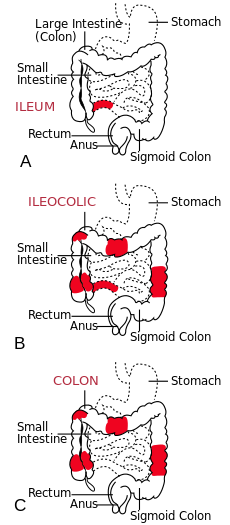What causes Crohn's disease ?

The three most common sites of intestinal involvement in Crohn's disease are ileal, ileocolic and colonic, Scientists believe that Crohn's disease is caused by a combination of these factors:
•Immune system problems
•Genetics
•Environmental factors
Usually cells of the immune system defend the body from harmful microbes bacteria, viruses, fungi, and other foreign substances that have entered it, The body doesn't usually respond to all microbes, however Many microbes are helpful especially for digestion. And so the immune system leaves them alone. If there is an invader that needs to be eliminated, your body's defense reaction begins. This immune system response causes inflammation, Immune system cells, chemicals, and fluids flood to the site to overcome the offending substance. After the substance has been disabled or removed, the immune response ends. Inflammation subsides,
For some reason people with Crohn's disease have an immune system that reacts inappropriately. The immune system may be defending the body against helpful microbes by mistake or for some other reason the inflammatory response simply will not stop either way over time this chronic inflammation in the digestive system can result in ulcers and other injuries to the intestines including complete blockages of the tract.
Recently a gene called NOD2 has been identified as being associated with Crohn's disease. This gene is important in determining how the body responds to some bacterial products. Individuals with mutations in this gene are more susceptible to developing Crohn's disease. Other genes are still being discovered and studied which are important in understanding the pathogenesis of Crohn's disease including autophagy related 16-like 1 gene (ATG 16L1) and IRGM, which both contribute to macrophage defects and have been identified with the Genome-Wide Association study2. In this regard, there have also been studies which show that in the intestines of individuals with Crohn's disease, there are higher levels of a certain type of bacterium, E. coli, which might play a role in the pathogenesis1. One postulated mechanism by which this could occur is though a genetically determined1 defect in elimination of the E. coli, by intestinal mucosal macrophages. The exact roles that these various factors play in the development of this disease remain unclear.
While Crohn's is an immune related disease it does not appear to be an autoimmune disease (in that the immune system is not being triggered by the body itself). The exact underlying immune problem is not clear however it may be an immunodeficiency state, About half of the overall risk is related to genetics with more than 70 genes found to be involved.
•Immune system problems
•Genetics
•Environmental factors
Usually cells of the immune system defend the body from harmful microbes bacteria, viruses, fungi, and other foreign substances that have entered it, The body doesn't usually respond to all microbes, however Many microbes are helpful especially for digestion. And so the immune system leaves them alone. If there is an invader that needs to be eliminated, your body's defense reaction begins. This immune system response causes inflammation, Immune system cells, chemicals, and fluids flood to the site to overcome the offending substance. After the substance has been disabled or removed, the immune response ends. Inflammation subsides,
For some reason people with Crohn's disease have an immune system that reacts inappropriately. The immune system may be defending the body against helpful microbes by mistake or for some other reason the inflammatory response simply will not stop either way over time this chronic inflammation in the digestive system can result in ulcers and other injuries to the intestines including complete blockages of the tract.
Recently a gene called NOD2 has been identified as being associated with Crohn's disease. This gene is important in determining how the body responds to some bacterial products. Individuals with mutations in this gene are more susceptible to developing Crohn's disease. Other genes are still being discovered and studied which are important in understanding the pathogenesis of Crohn's disease including autophagy related 16-like 1 gene (ATG 16L1) and IRGM, which both contribute to macrophage defects and have been identified with the Genome-Wide Association study2. In this regard, there have also been studies which show that in the intestines of individuals with Crohn's disease, there are higher levels of a certain type of bacterium, E. coli, which might play a role in the pathogenesis1. One postulated mechanism by which this could occur is though a genetically determined1 defect in elimination of the E. coli, by intestinal mucosal macrophages. The exact roles that these various factors play in the development of this disease remain unclear.
While Crohn's is an immune related disease it does not appear to be an autoimmune disease (in that the immune system is not being triggered by the body itself). The exact underlying immune problem is not clear however it may be an immunodeficiency state, About half of the overall risk is related to genetics with more than 70 genes found to be involved.
